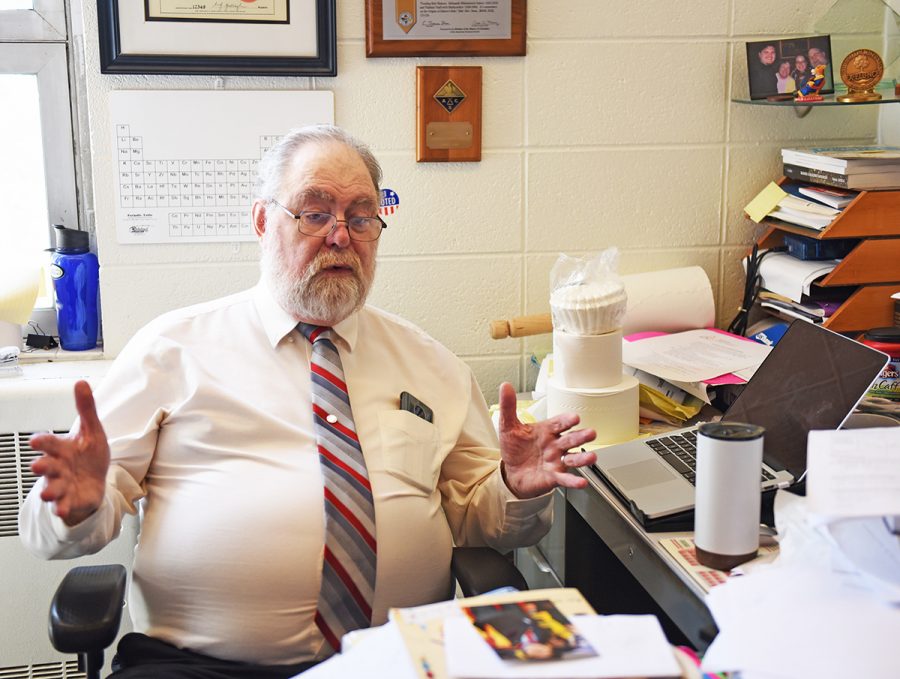Chemistry professor ‘very pleased’ he can take students to Russia as an immersion experience
Among receiving many awards, David Lewis said he enjoys taking students on these trips that provide them with rare learning opportunities
More stories from Ta'Leah Van Sistine
Photo by Elena Dawson
David Lewis is the recipient of the 2019 Markovnikov Medal.
David Lewis, a chemistry professor at UW-Eau Claire, has received many awards over the years.
Some of them include the 2018 HIST Award for Outstanding Achievement in the History of Chemistry and the 2019 Markovnikov Medal.
Although Lewis said he is proud to earn those awards, he also said he is very pleased he can show students “things they aren’t going to get from other chemists.”
In 2015, Lewis began bringing students to Russia, and specifically to the city of Kazan, as a part of the Faculty-Led International Immersion Experiences Program to look at the original work and samples of chemists the students learn about in their classes.
“Over one-third of the reactions they learn in the first two semesters of organic chemistry came out of Kazan,” Lewis said. “A lot of chemistry came out of Russia.”
With this first tour of students, Lewis said they had the opportunity to reduce many of the documents they viewed to an electronic format.
Lewis said for two weeks, they did nothing but photograph “books cover to cover.” Lewis would then eventually translate those works depicted in the photos when they returned to the United States.
“I have an in,” Lewis said, “so I was able to take my students.”
This “in,” or connection to Kazan, was formed when Lewis was a professor at South Dakota State University.
In 1994, Lewis said he wrote a couple of articles for the “Journal of Chemical Education” and titled them “The University of Kazan — Provincial Cradle of Russian Organic Chemistry.”
The rector of Kazan University was an organic chemist who saw Lewis’ articles, he said, and sent Lewis a letter, indicating his desire to meet.
Lewis said he and the rector unfortunately lost contact for a period of time, but were able to reconnect when Lewis sent him his book “Early Russian Organic Chemists and Their Legacy,” which was originally published in 2012.
“The next thing I know, I’m getting emails; ‘We found you! This is great!’” Lewis said.
At the start of November 2013, Lewis said he and his wife finally traveled to Kazan for the Kazan Conference where he said they were treated like royalty.
Lewis said he took another group of students to Kazan in 2017 where they conducted similar work to the 2015 group.
Sergei Raspel, a Blugold who graduated in December 2018 as an elementary education major, was one of the students on the 2017 trip with Lewis.
Raspel said he never had a class with Lewis. To his recollection, he believed they met when Raspel was talking to someone in Russian and Lewis overheard them speaking.
“‘Oh, my goodness, you know Russian!’’ Raspel recalled Lewis saying.
In conversation, Raspel said Lewis told him he wanted to find people who spoke Russian and could do some transcription and translation of historical artifacts because of an opportunity he had. He was referring to the trip to Kazan.
Although Raspel was an elementary education student, he said he “always enjoyed doing the higher level sciences” for his minor program in general science teaching.
Raspel also said, however, that personal ties to Russia also drew him to go on the trip to Kazan.
“I’m originally adopted from Russia,” Raspel said. “I never had the opportunity to go back and that was always something in my life I wanted to do.”
These intercultural and immersive experiences, Lewis said, have been important to students who have traveled to Kazan with him.
“It’s not only about preserving the history,” Lewis said.
Raspel said he really got to know Lewis throughout the 2017 trip and found that the professor has a passion for the universality of science.
“He’s just very interested in other cultures and how science is kind of a universal language,” Raspel said. “It doesn’t matter if you are in the United States or Russia, you can still do the same science. It might be in a different language, but the theory is the same.”
Taking students on these trips was a three or four year project in the making, Raspel said, and something Lewis wanted to involve students in.
“He knew what his end goal was and he knew how he wanted to get there,” Raspel said. “He just wanted to incorporate other students to help him who would also learn from that, and who would appreciate the culture — who would appreciate the history.”
Lewis said he has taught organic chemistry for 40 years now and confirmed that he is at the end of his career, but recognizes that students are at the beginning of theirs.
For the summer of 2020, he said he still hopes to take another group of students to Russia as a part of the International Fellows Program, and this time, the students would be specifically art students.
“There are photographs that are available in Russia that are very, very faded,” Lewis said. “The photographs themselves were shot on low contrast film and they have high grain, (so) the art students now are basically going to go into rescue mode.”
Lewis said the students will be “rescuing” these images by creating original line drawings, so they can still be used.
Ultimately, Lewis said these trips to Russia allow chemistry students to experience something they rarely have an opportunity to because of the way the chemistry degree is structured.
“Any kind of study abroad for chemistry students is usually at the expense of another semester on campus,” Lewis said. “So if I can get them three weeks over summer at one or two major Russian universities, then why shouldn’t I do it?”
Van Sistine can be reached at [email protected].











